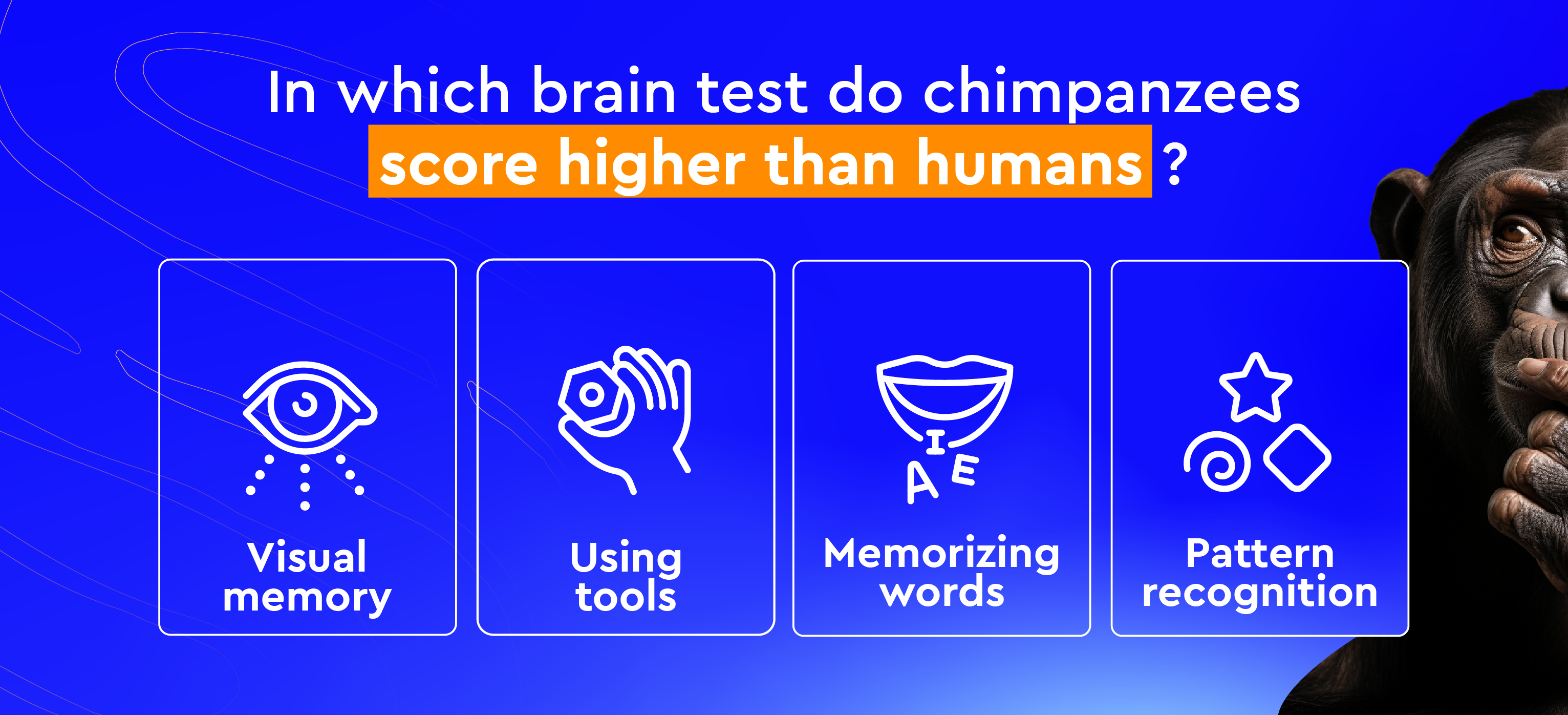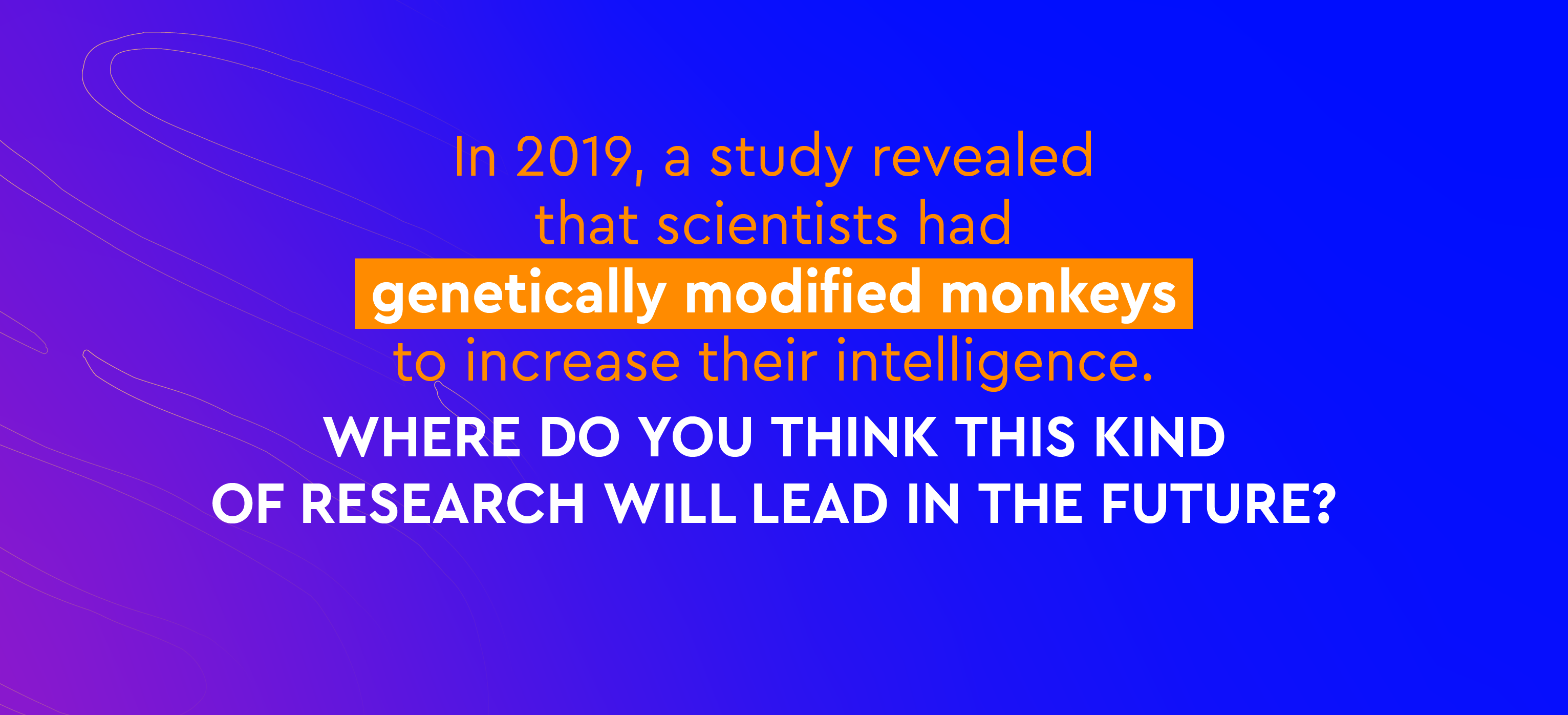

Could You Beat a Chimp in a Brain Test?
Could You Beat a Chimp in a Brain Test?
Throughout evolution, different animal species have acquired various sets of skills to adapt to their environment. Now, in the age of genetic engineering, all of this can change.
Young chimpanzees have an extraordinary memory. In a landmark experiment conducted in 2007 by researchers at Kyoto University in Japan, chimpanzees and humans were asked to memorize the locations of numbers briefly displayed on a screen. Young chimpanzees outperformed their human counterparts, demonstrating speed and accuracy that hinted at a remarkable ‘eidetic’ (or ‘photographic’) memory.
According to researchers, as humans evolved and their linguistic skills developed, their capacities for pattern recognition and photographic memory lessened. This is known as the ‘cognitive tradeoff hypothesis.’ While photographic memory might be advantageous for memorizing fruit locations at a glance, for instance, modern humans have less of a need for this skill, and so it weakened over time.
Throughout evolution, different animal species have acquired various sets of skills to adapt to their environment. Thus, it should come as no surprise that some species perform better than humans in certain tasks.
Now, in the age of genetic engineering, all of this can change. Would you like to have abilities that other animals possess? Or perhaps give animals some abilities they don’t currently have? That may be possible. In 2019, a study revealed that scientists had genetically modified monkeys by giving them copies of genes associated with human intelligence. The modified monkeys performed better on memory tests than their unmodified counterparts.
The use of genetic engineering in animals has increased significantly in recent years and it raises many ethical questions, especially when it comes to cognition. Some examples in pets: Scientists genetically engineered fish to “glow in the dark” by inserting genes from sea anemones and jellyfish, and have created hypoallergenic cats by removing certain genes. In farm animals, genetic engineering can be applied to improve animal productivity, food quality, and disease resistance. Of course, genetic engineering is now ubiquitous in animals used in pharmaceutical research.
The ethical issues are significant: from surgical procedures which are invasive and harmful to animals, to the fact that we can’t fully predict all of the consequences gene editing will bring to animals and the environment. But enhancing cognitive abilities through genetic engineering seems like a journey with an entirely unknown, and possibly dangerous, destination.
Group Activity
- Divide the group into several teams.
- Pick one of the questions from the list below and let each team discuss it and then present their thoughts to the group; Alternatively, assign each team with a different question, and when they present it to the group ask the remaining teams for their thoughts as well.
- If you choose question 3, assign different parts of the essay to the different teams: Invasiveness of procedures; Large numbers of animals required; Unanticipated welfare concerns; Beyond animal welfare. Ask each team to summarize their part’s main argument(s) and present it to the class. Things to notice and address: where was the article published (a magazine? A news website? An academic journal?) Who is the author (a columnist? An academic?).
Questions
- What evolutionary advantage does photographic memory have? How is it beneficial for a species’ survival?
- What skills do non-human animals have that you would like to have, and why?
- How might our definitions of ‘natural’ and ‘unnatural’ change as genetic engineering becomes more commonplace?
- If it were possible, would you genetically engineer your brain to improve your intelligence? What would be the societal implications of such actions?
- In 2019, a study revealed that scientists had genetically modified monkeys by giving them copies of genes associated with human intelligence. The modified monkeys performed better on memory tests than their unmodified counterparts. Given the implications of these technologies, do you consider them to be ethical? Where do you think this kind of research will lead in the future?
- If we improve animals’ cognitive abilities, might they deserve a new level of moral consideration? How would this affect our current societal structures and norms? Should we treat animals differently depending on their cognitive abilities?






